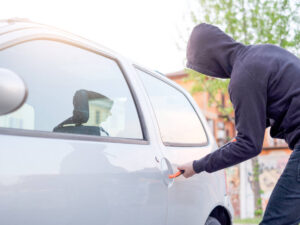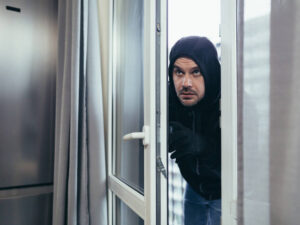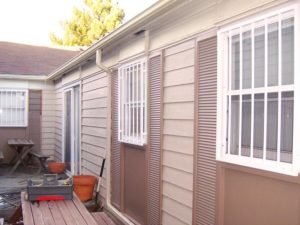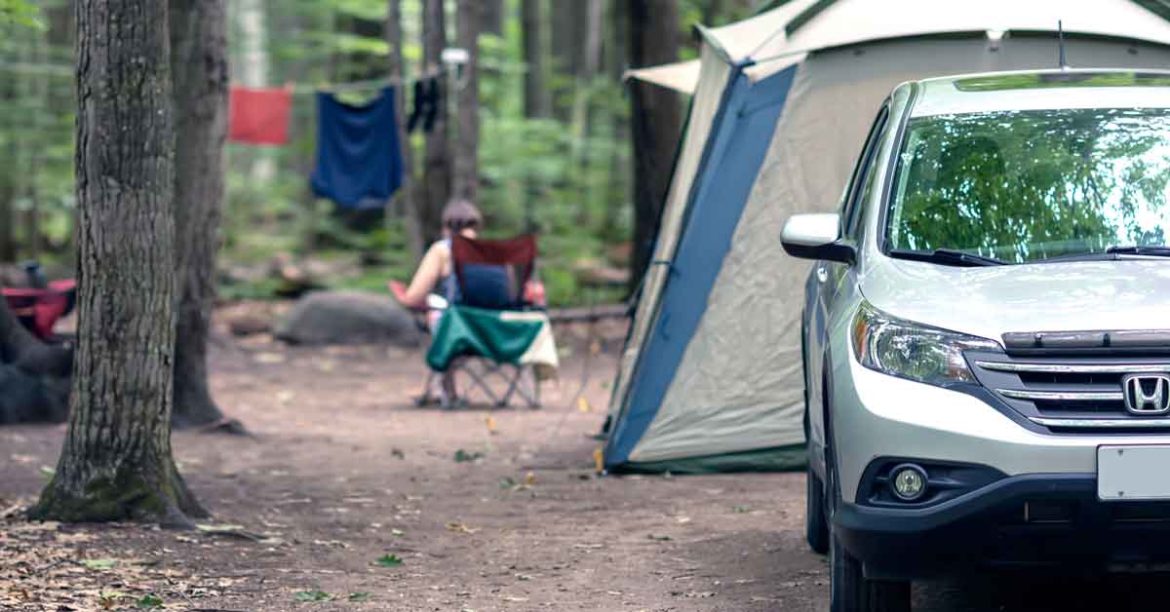
The United States is blessed with abundant recreational areas for campers. In the United States there are close to 7,000 state parks covering 14 million acres of land. There are over 150 national forests and grasslands to camp in. Then, there are the 245 MILLION acres of public lands, mostly in the West, that are managed by the Bureau of Land Management. Most of these lands allow camping – often dispersed camping where you just find a spot you like and set up camp. One of the best ways to find these public lands is through an App called US PUBLIC LANDS. Then, there are a multitude of improved and unimproved campsites managed by cities, counties, and quasi-government agencies. And, there are numerous privately-owned campsites all across the country. Whether you are camping in a trailer, motorhome or van or you just want to pitch tent – you can find a place.
When going camping most people don’t give much thought to security. They should! Whether you plan to camp in an established pay campsite or in some remote backcountry site, you are vulnerable to theft, vandalism and invasion. Every year campers lose hundreds of thousands of dollars’ worth of property to thieves. Tents, sleeping bags, coolers, cook stoves – just about everything you can have at a campsite can be stolen and is sometimes stolen! Worse yet, the Internet is replete with news stories of campers who were physically injured by intruders or in some cases even murdered.
It’s not practical to turn your chosen campsite into a fortress, but security should always be on your mind. Here are some basic steps campers can take to make their camping trips safer and more enjoyable.
Select the right Campsite:
For some the right campsite is a private site where you can park huge RVs and run a loud generator. For others it will be a remote logging area where you can park a van or set up a tent. Others will decide some dispersed camping on public lands is best for them. Whatever site you select, always keep security in mind and follow your “gut” instincts.
Trusting your gut means following the physical feelings your body gives you that you are making the right or wrong decision. Is there someone camping nearby that looks a little sketchy? Is there some trash in the area that might indicate the area is a local ‘party area?’ Are there negative reviews online about the particular area? Is there cell service in the area in case you need to call 911? These are just a few things security conscious campers should think about.
The bottom line: If you don’t feel right about a particular spot do not camp there despite how inviting it might seem. Gut instincts are not always correct but they are based on your brain’s appraisal of a situation. The human brain is constantly comparing our current situation with our memories and knowledge base. So, when a decision feels intuitive, it might in fact be accurate. In the case of your personal security, it is better to be mistaken than sorry.
Know where you are:
This seems so elementary but do you really know where you are camping? If you are in an established campground, you certainly should know where you are. But if you are camped in an unimproved campsite off- the-beaten-path it’s not always so simple. If you had to call 911 in an emergency, would you be able to tell the emergency dispatcher exactly where you are?
Many 911 systems can automatically detect your GPS coordinates from your phone but some 911 call centers in more rural areas might not be capable of doing this on a timely basis. Know where you are!
 If you are in a more remote area and your phone says NO SERVICE can you still call 911? It most cases, yes! When your phone loses signal from your provider’s network, it automatically connects to the strongest network that it can find in order to allow for emergency calls to go through. However, since it is not your network, you cannot make other calls. And, calls to 911 on phones without active service do not deliver the caller’s location to the 911 call center, and the call center cannot call these phones back to find out the caller’s location or the nature of the emergency. If disconnected, the 911 center has no way to call back the caller. Know where you are!
If you are in a more remote area and your phone says NO SERVICE can you still call 911? It most cases, yes! When your phone loses signal from your provider’s network, it automatically connects to the strongest network that it can find in order to allow for emergency calls to go through. However, since it is not your network, you cannot make other calls. And, calls to 911 on phones without active service do not deliver the caller’s location to the 911 call center, and the call center cannot call these phones back to find out the caller’s location or the nature of the emergency. If disconnected, the 911 center has no way to call back the caller. Know where you are!
Deter – Detect – Repel
In addition to selecting a campsite with security in mind; Deterring, Detecting and if necessary, repelling an intruder should be your goal.
Deterring Crooks and Assorted Malefactors
Most camping thefts occur while campers are away from camp. Your goal is to deter a would-be thief by making your campsite less attractive. If your campsite does not look like an easy mark, hopefully the thieves will pass by and look for easier pickings.
Tips:
Do not leave expensive equipment in plain sight.
* Some coolers are nothing more than cheap uninsulated plastic boxes but many high-end coolers can cost hundreds of dollars. When you leave your campsite to fish, hike, bird watch or just visit with fellow campers down the road, put your coolers where they cannot be easily seen. Setting up a small tent and storing your smaller valuable items inside is a good idea.
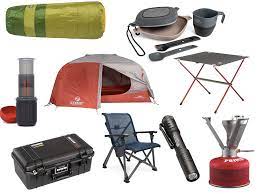 It might not be practical to stow larger items like generators, power stations, solar panels and propane appliances in a tent. To make these valuable items harder to steal consider chaining them to a tree or at least chaining them together to make it more difficult for a thief to just do a “grab-n-go.” A good quality cable lock often works well for “chaining” items together. Sure, a thief could come with bolt cutters or an angle grinder and cut your chains, cables and locks but most campsite thieves don’t carry these burglar tools. They want to just nonchalantly grab something and make their get-a-way.
It might not be practical to stow larger items like generators, power stations, solar panels and propane appliances in a tent. To make these valuable items harder to steal consider chaining them to a tree or at least chaining them together to make it more difficult for a thief to just do a “grab-n-go.” A good quality cable lock often works well for “chaining” items together. Sure, a thief could come with bolt cutters or an angle grinder and cut your chains, cables and locks but most campsite thieves don’t carry these burglar tools. They want to just nonchalantly grab something and make their get-a-way.
Trailers and ATVs should be secured with a wheel lock. I am also a proponent of using the old-fashioned steering wheel locking device (i.e., “The Club”) on vehicles parked at your campsite. Refer to another article for my thoughts on this: https://physicalsecurityonline.com/steering-wheels-locking-devices-do-they-really-prevent-vehicle-theft/
Create the Illusion of Occupancy
* Even if you are camping alone, setting up a tent (or an extra tent) can give the illusion that more than one person might be there. When leaving your campsite, it is a good idea to also put a battery powered radio in the tent and turn it on just loud enough so that someone who walks up to the tent can hear it. A would-be thief might think someone is inside resting and leave quickly.
* Some campers have gone so far as putting a handwritten note on their tent or camper saying: “CAUTION. I have COVID. I am isolating myself at this campsite.” Leave a few COVID masks lying around in plain view and as a would-be thief walks into your campsite, he (or she) will hear the radio in your tent and see your sign. They will likely just leave. Such a sign can also be taped to the window of a parked camper van or motorhome.
Detecting Intruders
* There are a number of simple off-grid perimeter alarms that can be setup around the entrance of a campsite that will alert you if anyone or an animal wanders into your camp. The physical area where your campsite is will determine if such a set-up will work but they all work basically the same way. They involve setting up trip wires using fishing line that is hard for an intruder to notice – especially in low light or at night. The trip wire is attached to a battery-powered screech alarm. When the ‘trip wire’ is disturbed, the alarm activates. A quick YouTube search will show many different system set-ups. Most are low-tech and can be set-up for less than a twenty-dollar bill.
Another option are battery-powered motion sensor alarms or lights. These can be very inexpensive but are often tripped by wind, squirrels, birds and other small animals so they are not often practical. But a motion sensor alarm set up inside a tent, camper or trailer can set off a loud screeching siren that might scare an intruder away.
* Trail cameras are a good option if you want to see who might be snooping around your campsite when you are away but they are not likely to prevent a crime. If you use a trail cam camouflage it well and understand that if it is detected by a thief, the thief will likely steal it! For an in-depth discussion on whether security cameras deter crime, see my previous article titled: What Good are Security Surveillance Cameras? https://physicalsecurityonline.com/what-good-are-security-surveillance-cameras/
Repelling Intruders
If your efforts to prevent campsite intruders failed (or is you just neglected to take any precautions) and you discover an intruder in your campsite either in the middle of the night when you are sleeping, or maybe when you return to your campsite, STAY CALM. When the intruder realizes he (or she – because woman can be crooks too) is detected, they will often make up some B.S. story about why they are in your campsite and just leave.
STAY CALM.
If you cannot avoid coming face-to-face with an intruder, STAY CALM. Project confidence even if you are shaking in your boots. Calmly, but it a stern voice, tell the intruder to PLEASE LEAVE. If the intruder does not immediately turn to leave, repeat the command PLEASE LEAVE! Be cognizant of the possibly that the trespasser is intoxicated on some substance and may not clearly understand your commands. Unless the intruder starts making threats or you sense some physical violence, repeat your command to PLEASE LEAVE over and over. It is likely the intruder will finally get the message and leave.
But, even if the intruder leaves, realize that he or she might not have gone far. They may be lurking nearby and continue to pose a threat. If you have cell-phone service, call 911 and report the intrusion. Ask for an officer to come by and check the area.
If the intruder is about to attack you, take whatever means you have at the moment to fight-off the attack. Realize that even if you are not armed with a gun or canister of bear spray* you likely have other “weapons” at your disposal. Know what these weapons are and use them! See my previous article titled: You Are Not Defenseless – Defend Yourself with Common Everyday Weapons. https://physicalsecurityonline.com/you-are-not-defenseless-defend-yourself-with-common-everyday-weapons/
* Bear spray can be a good defense weapon against wild animals and humans. If you decide to purchase bear spray – know how to use it. Buy several canisters and go somewhere where you can test it and practice with it. Know firsthand how far it will spray. Know what kind of spray pattern you will get in different wind conditions. Know how to use it! DO NOT simply rely on the use instructions that might come on a small piece of paper when you bought the canister. DO NOT rely on some 5-minute YouTube video. Practice with the real thing so that if you ever need to use it you will know from experience what to expect.
Summary:
Few campers think about campsite security. Even after reading this article few people will take any security measures the next time they go camping. Most of the time these campers will be just fine. But it is always better to be prepared.
Have a security plan even if the plan is just in your head. Understand that “bad things” sometimes do happen in the middle of nowhere. Know how to conceal and secure your valuables. Know what to do if you discover someone trespassing in your campsite. Being security conscious when you are camping is the first step in making your camping trip safer and more enjoyable.

